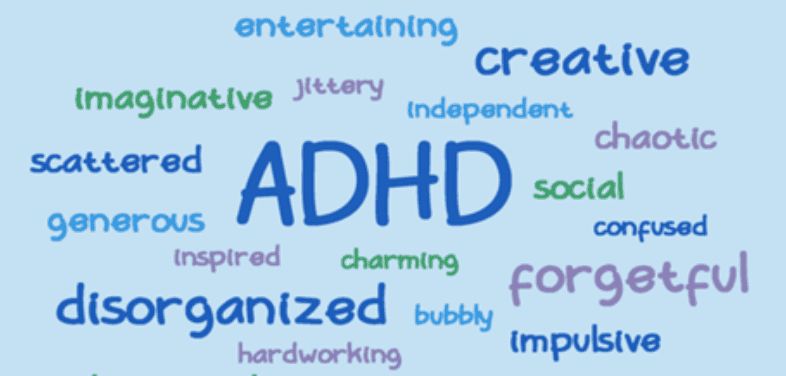Exploring The Impact Of Group Support On ADHD

Table of Contents
Understanding the Challenges of ADHD and the Need for Support
Attention-Deficit/Hyperactivity Disorder (ADHD) is a neurodevelopmental disorder characterized by persistent patterns of inattention, hyperactivity, and impulsivity. These core symptoms significantly impact daily life, leading to various emotional and social challenges. While medication can be helpful for some, it often isn't enough. Many individuals with ADHD also struggle with:
- Difficulty with focus and organization: This can manifest as missed deadlines, lost items, and a general sense of overwhelm.
- Impulsive behavior leading to negative consequences: Impulsivity can lead to regrettable decisions, financial difficulties, and strained relationships.
- Social difficulties and relationship challenges: Misunderstandings, emotional outbursts, and difficulty reading social cues can impact friendships and romantic relationships.
- Low self-esteem and feelings of inadequacy: The constant struggle with symptoms can lead to feelings of frustration, self-doubt, and low self-worth.
- Increased stress and anxiety: The daily challenges of managing ADHD can contribute to significant stress and anxiety levels.
Traditional therapeutic approaches, while beneficial, often lack the comprehensive support that many individuals with ADHD require. This is where the holistic support of group settings becomes invaluable.
Types of Group Support for ADHD Adults and Children
Fortunately, there are various types of group support available to help individuals with ADHD thrive. These options cater to different age groups and needs:
Therapy Groups for ADHD
Therapy groups, often incorporating Cognitive Behavioral Therapy (CBT) techniques, provide a structured environment for learning coping mechanisms and strategies. The shared experience within a group setting allows members to learn from each other, reducing feelings of isolation and fostering a sense of community. Benefits include:
- Learning practical coping strategies: Group members share techniques for managing impulsivity, improving focus, and enhancing organizational skills.
- Building social skills: The group setting provides a safe space to practice social interaction and receive constructive feedback.
- Reducing feelings of isolation: Sharing experiences with others who understand helps alleviate feelings of loneliness and inadequacy.
- Increased self-awareness: Through group discussions and feedback, members gain valuable insights into their own behaviors and thought patterns.
Support Groups for Parents of Children with ADHD
Parenting a child with ADHD presents unique challenges. Support groups specifically designed for parents offer a vital outlet for sharing experiences, exchanging advice, and gaining valuable information. These groups provide:
- A safe space to share frustrations and celebrate successes: Parents can connect with others facing similar challenges, reducing feelings of isolation and overwhelm.
- Access to valuable information and resources: Groups often share information on effective parenting strategies, educational support, and community resources.
- Strategies for supporting their child's emotional and social development: Parents learn strategies to help their children manage their symptoms and build self-esteem.
- Peer support and encouragement: The encouragement and understanding of fellow parents can make a significant difference in managing the stress of parenting a child with ADHD.
Online Support Groups and Communities for ADHD
The rise of online platforms has made accessing support easier than ever before. Online support groups and communities offer convenience and accessibility, connecting individuals across geographical boundaries. While offering many advantages, it’s crucial to remember the limitations of online interaction, particularly the absence of direct, non-verbal communication.
- 24/7 access to support: Members can connect with others anytime, anywhere.
- Anonymity and confidentiality: Online platforms can provide a sense of safety and anonymity for those who prefer it.
- Diverse perspectives and experiences: Online groups often include individuals from diverse backgrounds and experiences, broadening perspectives.
- Potential for less personal connection: Lack of face-to-face interaction may limit the depth of connection compared to in-person groups.
Benefits of Group Support for ADHD Symptoms Management
Participating in a support group can significantly improve various aspects of managing ADHD symptoms:
Improved Focus and Organization
Group settings offer opportunities to learn and practice strategies for improving focus and organization. Members share tips on time management, prioritization, and utilizing organizational tools.
- Shared strategies for time management: Members learn techniques like the Pomodoro Technique and time blocking to improve focus and productivity.
- Practical tips for organization: Discussions on using planners, digital tools, and other organizational aids are common.
- Accountability and support: Group members provide each other with encouragement and support to stay on track.
Enhanced Emotional Regulation
Sharing experiences and receiving validation from others who understand helps manage emotional outbursts and impulsivity. Group therapy can teach members healthy coping mechanisms.
- Identifying triggers and developing coping strategies: Members identify personal triggers for emotional outbursts and learn techniques for managing them.
- Developing emotional intelligence: Group discussions help members understand and manage their emotions more effectively.
- Building resilience: Support from peers and facilitators helps members develop resilience in the face of challenges.
Stronger Social Skills and Relationships
The group setting provides a safe space to practice social skills and receive feedback. This can lead to improved communication, empathy, and relationship building.
- Learning effective communication techniques: Members learn how to communicate their needs and feelings more effectively.
- Building empathy and understanding: Hearing others' experiences fosters empathy and understanding.
- Developing healthy relationships: Members gain skills and confidence to build and maintain healthy relationships.
Increased Self-Esteem and Confidence
Sharing experiences and receiving positive feedback from peers and facilitators can significantly boost self-esteem and confidence. The shared journey fosters a sense of belonging and validation.
- Celebrating successes and acknowledging challenges: Members celebrate their achievements and acknowledge their struggles without judgment.
- Building self-compassion: The supportive environment fosters self-compassion and reduces self-criticism.
- Increased self-efficacy: Successfully implementing strategies and receiving positive feedback increases feelings of self-efficacy and competence.
Finding and Choosing the Right Group Support for ADHD
Finding the right group is crucial for success. Consider these tips:
- Online searches: Use keywords like "ADHD support groups near me," "ADHD parent support groups," or "online ADHD communities."
- Local support organizations: Contact local mental health organizations or ADHD support groups for referrals.
- Therapist referrals: Your therapist or psychiatrist can provide recommendations for suitable groups.
When choosing a group, consider:
- Group size and format: Consider whether an in-person or online format suits your needs and preferences. Smaller groups may offer more personalized attention.
- Group's focus and target audience: Ensure the group aligns with your specific needs (e.g., adults, children, parents).
- Facilitator's experience and training: Look for a facilitator with experience working with individuals with ADHD.
- Reviews and testimonials: If possible, read reviews or testimonials from past participants.
Harnessing the Power of Group Support for ADHD Success
Group support offers a powerful tool for managing ADHD symptoms and improving overall well-being. From enhanced focus and organization to improved emotional regulation and stronger relationships, the benefits are significant. Remember to choose a group that best suits your needs and preferences. Start your journey towards better ADHD management by exploring the many benefits of group support. Find an ADHD support group near you today and experience the transformative power of shared experience and understanding. Don't hesitate to seek out ADHD support groups, actively pursue finding ADHD support, or consider group therapy for ADHD to unlock your full potential and improve your quality of life.

Featured Posts
-
 How Trumps Tariffs On China Led To Higher Prices And Empty Shelves In The Us
Apr 29, 2025
How Trumps Tariffs On China Led To Higher Prices And Empty Shelves In The Us
Apr 29, 2025 -
 Akeso Stock Plummets On Negative Cancer Drug Trial Data
Apr 29, 2025
Akeso Stock Plummets On Negative Cancer Drug Trial Data
Apr 29, 2025 -
 Reliance Shares Surge Biggest Gain In A Decade
Apr 29, 2025
Reliance Shares Surge Biggest Gain In A Decade
Apr 29, 2025 -
 One Year Ban Saudi Wealth Fund Cuts Ties With Pw C
Apr 29, 2025
One Year Ban Saudi Wealth Fund Cuts Ties With Pw C
Apr 29, 2025 -
 Understanding The Treasury Market Shift Insights From April 8th
Apr 29, 2025
Understanding The Treasury Market Shift Insights From April 8th
Apr 29, 2025
Latest Posts
-
 Ru Pauls Drag Race Live Milestone 1000th Show Global Broadcast
Apr 30, 2025
Ru Pauls Drag Race Live Milestone 1000th Show Global Broadcast
Apr 30, 2025 -
 Las Vegas Ru Pauls Drag Race Live 1000th Show Global Livestream
Apr 30, 2025
Las Vegas Ru Pauls Drag Race Live 1000th Show Global Livestream
Apr 30, 2025 -
 The Unexpected Bond Charles Barkley And A Ru Pauls Drag Race Star
Apr 30, 2025
The Unexpected Bond Charles Barkley And A Ru Pauls Drag Race Star
Apr 30, 2025 -
 Ru Pauls Drag Race Season 17 Episode 8 Preview Of The Wicked Challenge
Apr 30, 2025
Ru Pauls Drag Race Season 17 Episode 8 Preview Of The Wicked Challenge
Apr 30, 2025 -
 Ru Pauls Drag Race Live 1000th Show Livestream From Las Vegas
Apr 30, 2025
Ru Pauls Drag Race Live 1000th Show Livestream From Las Vegas
Apr 30, 2025
